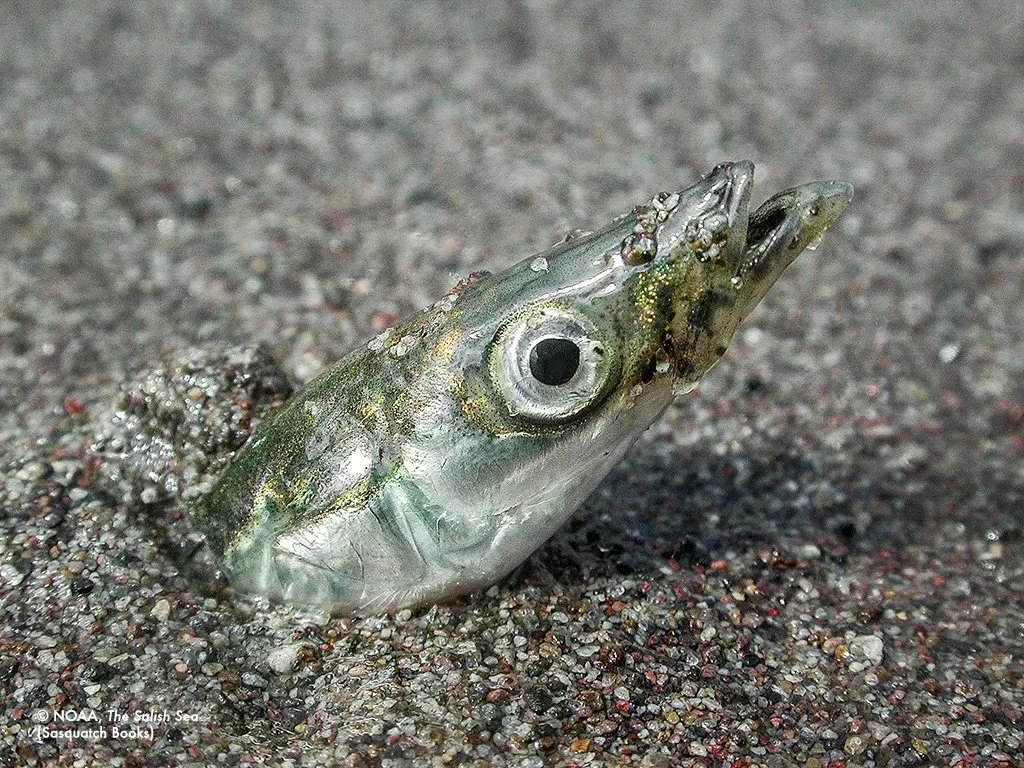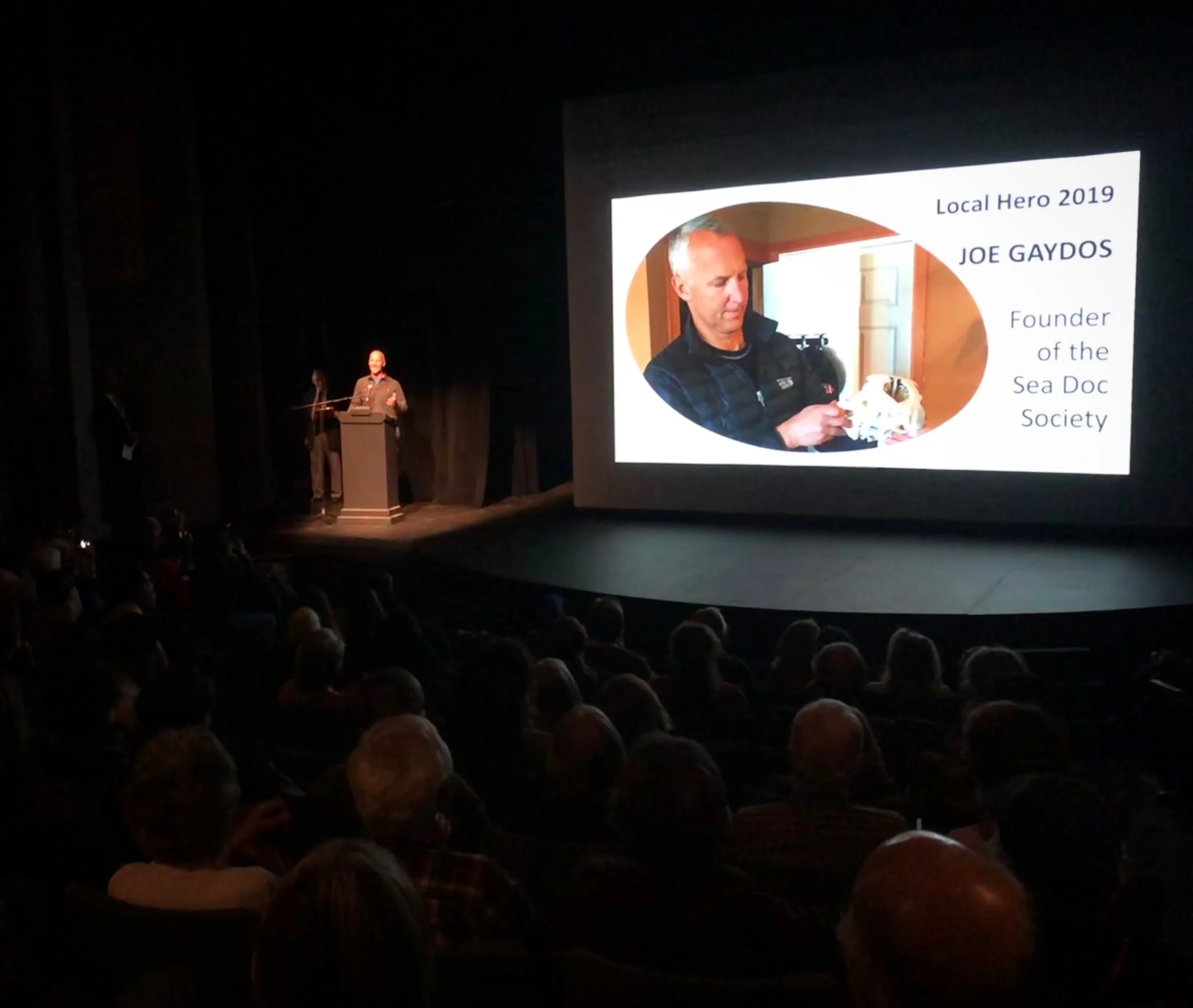The story of how SeaDoc Society went from a big idea to a proper organization with a scientist and a mission and a proper name, as told by a vital board member who was in those early conversations.
Lost Fishing Net Strewn Across the Salish Sea Floor Near San Juan Island
On a recent research dive near San Juan Island, SeaDoc Society Science Director Joe Gaydos captured video of a large fishing net clinging to the rocky ocean floor. We immediately reported the net to the on-line, no fault reporting hotline so they can begin the process of removal, which is a complex and dangerous job - even for trained professionals.
Pacific Bluefin Tuna Found on Orcas Island Beach (PHOTOS/VIDEO)
How did you start your day? Was it by looking at a massive #bluefin tuna that washed up on the beach near your home? That’s how we did! That’s right, we woke up to find this beautiful bluefin tuna dead on Crescent Beach in Eastsound—right here on Orcas Island.
Into the Sandy Sea Floor with a Vital Forage Fish
“Well-aerated, well-sorted, medium-to coarse-grain...” might sound like a wine flavor profile, but it actually describes the type of sandy, sea floor habitat preferred by Pacific sand lance. Sand lance play a crucial role in the Salish Sea’s food web, providing nutrition for everything from seabirds to whales, salmon, and lingcod. It’s thought that one sand wave field in the San Juan Archipelago alone could be home to over 12 million sand lance, but we’re only beginning to learn about their habitat.
Slowing Down on Sucia Island
It’s easy when you live in the Salish Sea to feel like you’re sort of perpetually camping. Water surrounds you, trees line up on the horizon, the air is fresh, etc. etc. etc. But you also have a phone in your pocket and bills to pay and new series to binge on Netflix. Sure it’s beautiful outside, but those are the trappings of regular nine-to-five type stuff. The forays into nature are carved out and fleeting.
The State of the Salish Sea
Last week marked the release of the highly anticipated State of the Salish Sea Report, authored by Kathryn L. Sobocinski of Western Washington University. SeaDoc Society Science Director Joe Gaydos has served on the advisory committee for the project since 2016.
Joe’s involvement began when Bert Webber, who led the charge to name the Salish Sea, and Ginny Broadhurst of the Salish Sea Institute, invited him onto the 8-person committee.
Planet Ocean: Why We All Need Ocean Health (BOOK REVIEW)
If more than 70% of the earth’s surface is ocean and we even call it the blue planet, then why have we so grossly understudied marine ecosystems from a conservation science perspective? It might be that not enough humans realize how the ocean creates the water we drink, the oxygen we breath and the food we eat. Afterall, if everybody knew how critical the ocean is for life on earth, we’d surely be taking better care of it.
Advising on Whale Watch Guidelines & Bridging the Gap Between Science & Policy
Last week, our Science Director, Joe Gaydos, presented to the Washington Fish and Wildlife Commission about an upcoming decision they face concerning new whale watching guidelines.
Like most of SeaDoc's science-based work, our efforts are integrated and layered to be more effective at driving conservation. Here’s how how something like this presentation (which you can read in full here) comes about and how it can help drive change:
Salish Sea Wild: Shaking Hands With the World’s Biggest Octopus
A Message of Compassion and Hope from SeaDoc
According to the US Centers for Disease Control and Prevention, the stress related to the fear and anxiety surrounding the health, social, and economic implications of this pandemic, is real. One thing they suggest to combat this is to spend time focusing on something positive. We recommend the ocean.
Calling for 2020 Salish Sea Science Prize Nominations
Biennially, the SeaDoc Society awards the Salish Sea Science Prize to a prominent scientist or team of scientists whose work has resulted in the marked improvement of management or policy related to the conservation of marine wildlife and the Salish Sea marine ecosystem. Non-scientists who have used science in a substantial way to improve management or policy related to healing the Salish Sea also will be considered. This is the only award of its kind. The recipient(s) does not need to be a resident of Washington or British Columbia as long as their scientific efforts or use of science have led to measurable impacts on the Salish Sea ecosystem. The $2,000 prize comes with no strings attached and is designed to highlight the importance of science in providing a foundation for designing a healthy Salish Sea ecosystem. This award is given in recognition of and to honor Stephanie Wagner, who loved the region and its wildlife.
Help Our Lost Killer Whale Find the Salish Sea (VIDEO)
Only 5% of Washingtonians and 14% of British Columbians know what the Salish Sea is. So we did what any good scientific organization would do and hit the streets of Seattle while wearing a killer whale costume to see if they know the name of the sea right in their backyard. Could they help our orca find the Salish Sea?
Giving Thanks for Bill Ruckelshaus
I was saddened to hear of the passing of Bill Ruckelshaus, first and fifth head of the U.S. Environmental Protection Agency, Deputy Attorney General of the U.S., acting Director of the FBI, a Member of the U.S. Commission on Ocean Policy, founding Chair of the Puget Sound Partnership and the recipient of the highest civilian honor, the Presidential Medal of Freedom. He served four Presidents and three Governors and was mentor and friend to both me and the SeaDoc Society.
I first met Bill when he played an instrumental role in setting up Washington’s Puget Sound Partnership under Governor Gregoire. Over the years, I was so impressed that a person of his stature and intellect always graciously took time to answer my questions and guide be on policy and process needed to improve the health of the Salish Sea for the benefit of people, wildlife and our economy.
Salish Sea Wild: The Salish Sea’s Greatest Spectacle
Team SeaDoc witnesses the Pacific Northwest’s most awesome wildlife spectacle as more than 100 million spawning herring lure the greatest annual gathering of Salish Sea predators to the Strait of Georgia. Join us for front-row seats above and below the water as thousands of marine mammals and seabirds, hundreds of hungry raptors, and packs of killer whales assemble for the feast.
Farewell to SeaDoc Regional Director Markus Naugle
Since 2016, The SeaDoc Society has grown its impact and reach, expanding not only our scientific capacity but also launching our youth education program and accelerating outreach efforts. This heady time for SeaDoc has been led by Regional Director Markus Naugle.
This month, Markus announced his resignation as Regional Director from SeaDoc Society due to recent changes in his father’s health that require Markus’ help. Please join us in wishing Markus and his family all the best in this time of need.
Joe Gaydos Receives Local Hero Award at Friday Harbor Film Festival
SeaDoc Society Science Director Joe Gaydos received the Local Hero award at the Friday Harbor Film Festival over the weekend for his work with the SeaDoc Society and his involvement in the San Juan Islands community. He took a moment to thank the local supporters who have made SeaDoc’s work possible. For those who weren’t able to attend, we offer Joe’s thanks in this post.
Joe Gaydos to be Honored as Local Hero
Our Science Director, Joe Gaydos, will be honored with the Local Hero Award at the Friday Harbor Film Festival on San Juan Island this fall! The award will be presented at 7pm on October 27th, the final night of the festival. If you’re interested in attending the event, which takes place at the Whittier Theatre at the San Juan Community Theatre, check out their website for ticket information.
Photos from the 2019 Wine & Sea Auction
Beneath Pacific Tides: Subtidal Invertebrates of the West Coast (Book Review)
Team SeaDoc Does the Salish Splash! (VIDEO)
The Salish Splash is an annual event that brings awareness to the Salish Sea and its many species. Our Science Director Joe Gaydos was challenged by Mindy Roberts of the Washington Environmental Council. After doing a backflip for this event last year, Joe wanted to take it up a notch, so he invited all of Team SeaDoc to join him for an even bigger splash! What better way to show your support and enthusiasm for orca recovery and Salish Sea health than by jumping for joy into the water?
















